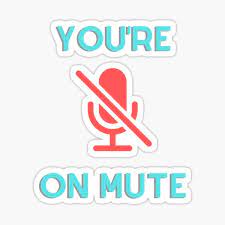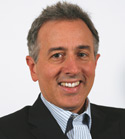“I Think You Are On Mute”
by Lou Zacharilla
New York City, NY, July 2, 2021--If they asked me to write my personal history of the Pandemic the title would be, “You’re On Mute.”
While technology for sure allowed us to continue to do our work online, it is fact, as John Updike wrote, that “for every piece of candy there is a toothache somewhere.”
 The era of Zoom, WebEx, TEAMS, Skype, Face Time have also given us a new type of burnout.
The era of Zoom, WebEx, TEAMS, Skype, Face Time have also given us a new type of burnout.
A year or more of well-educated, driven and ambitious human beings sheltered like hermits in their fine homes, restrained from normal social activities by a disease no naked eye can see and no physician could until recently keep in check, has taken a toll on our durablee but frail species. Psychologist Lisa Wolf recently wrote, “Early findings show that symptoms of anxiety and depression as a result of COVID-19 are present in up to 41.5% of the USA’s population. To quote myself, and not Ms Wolf, we have been through some pretty shitty times.
Now to the candy part.
There has been, as the law of physics dictate, a reaction. There are inevitably unintended consequences from even awful events, including during a time of plague. The most appealing were the days during the Lockdown when Nature showed her resilience. Suddenly, our air was clean. I recall vividly a walk to the East River as my first moment of surprise. Looking at the sky over New York City and its deserted roadways I saw a clear, primal blue. A clean blue. So THIS is what clean air looks like!
We read famously of fish (including dolphins) showing up in the Grand Canal of Venice, perhaps for leftover pasta with anchovies. Haggard but eternally beautiful Venice seemed revived while its tourists, who usually flock like chum to hit on its stone flesh, were home watching Chappelle on Netflix.
We could breathe again even as, ironically, a virus was spreading through our pulmonary passages. “It felt like I had crushed glass in my lungs every time I coughed,” said a friend from Rochester who had it early on.
The planet was evidently feeling the same way.
As a result, plans and ideas for monitoring climate change were pushed upstream. A new report by the Oceana organization noted that wealthy nations subsidizing large-scale fishing fleets are transferring overfishing risks to other nations. It recommended something called the Transparent Oceans Initiative (TOI). https://www.instagram.com/p/CQwWoXJFjyd/
The TOI documents the activities of nations engaged in fishing on the high seas and the distant waters of other countries. It attempts to find a way to restrict or eliminate harmful fishery subsidies.
That is one step toward restoring the balance. Other actions, like monitoring methane gas emissions are the low-hanging fruit for reversing global warming, according to Dr. Steve Hamburg, Chief Scientist of the Environmental Defense Fund. He noted how this will work in his “Better Satellite World” Podcast where he describes the MethaneSat initiative. https://www.sspi.org/articles/better-satellite-world-podcast-risk-a-conversation-with-environmental-defense-funds-dr-steve-hamburg
Many policy-makers are now asking, “How do we monitor compliance with environmental or climate change treaties, rules or legal endeavors?”
The answer is as simple as watching a swan paddle along a Venetian Canal. Satellites and satellite services companies.
If you have been paying attention, you will note that dozens of companies in our industry offer service and data analytics services related to climate change and ESG. Companies like Bluefield Technologies, SatSure and Planet. Dr. Hamburg’s MethaneSat is one example of a well-planned business model and program. It locates and measures methane emissions from oil and gas operations with precision and at a scale never achieved. This provides real data for making decisions about climate change. In the Podcast he talks about what they accomplished in the State of Florida, where the impact of climate change is quite devastating.
We were never trying to be slick or presumptuous when we claimed that satellites make a “Better Satellite World.” We were on mute as an industry for a long time about what we were doing since the days when NASA satellites discovered the hole in the Ozone Layer. Now, the commercial side is breaking out. What we need to watch for are the unintended consequences of our effort. Whether it is orbital debris (national hubris by any other name), spectrum interference or a lack of attention to seizing opportunities in new markets – each can become the toothache if we forget to remember what it was like that day when the blue sky was blue again.
---------------------------------------
 Lou Zacharilla is the Director of Innovation and Development of the Space and Satellite Professionals International (SSPI). He can be reached at: LZacharilla@sspi.org
Lou Zacharilla is the Director of Innovation and Development of the Space and Satellite Professionals International (SSPI). He can be reached at: LZacharilla@sspi.org





